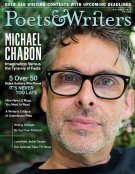After leaving his post as the editor of the British journal Granta in 2013, critic John Freeman returned to the world of literary magazines last October with the debut of Freeman’s, a hefty biannual of new poetry, fiction, nonfiction, and photography. Based in New York City and published in collaboration with Grove Press and the New School, each issue revolves around a theme. For the journal’s second installment—released in August and featuring work from Tracy K. Smith, Valeria Luiselli, and Alexander Chee, among others—Freeman also organized a tour of more than forty readings and events across the United States, as well as in New Zealand, Australia, Germany, and Canada. Days before the second issue’s New York release, Freeman talked about his vision for the journal.

What draws you to the journal as a form?
For me, there’s nothing quite so pure—nor so enjoyable—as being an advocate for writers whose work I love. It’s not just the sound of their voice and the beauty of their prose or poetry; it’s not just giving them a space to do what it is they do, or even a small paycheck for doing it; it’s that there’s a whole world of light and possibility in the best writers. Their stories and their poems and their memoirs and their recordings are like free radicals for living. It’s about helping writers like that get their voice out in the world.
Freeman’s has been described as part journal, part anthology. What quality of an anthology does it share?
I hope its durability. Anthologies, the best of them, kind of stick around. I think of Arna Bontemps’s American Negro Poetry, and Donald Hall’s anthologies of American poetry. I want the journal to have that same sense of longevity and durability, but I don’t want it to be published into quite as much of a niche. It’s not curating a segment of writing, the way that a lot of anthologies are. I also hope the periodicity of Freeman’s has us speaking not just into the present artistic moment, but also to the present political and historical moment.
Does it have an international focus?
Yes—it’s published in the United States, Australia, England, and Romania, and I’m looking into getting it published in Mexico and Argentina. What I want is to choose the best of the writers that feel localized [within a particular culture] and put them into a kind of global context. Weirdly, we don’t have many literary journals that do that. The overarching aesthetic of this journal is this kind of transnational narrative impulse to take writers out of their national silos, their gender silos, and look at everyone as equal.
Why do you think an international focus is important?
I think we’re in this weird part of capital life where the Internet is this incredible metaphor for the market and the world we live in. There’s no sense of time or place, everything happens simultaneously, and it practically moves at the speed of light. But capital depends on the movement of labor, and we’re watching now how slowly labor moves across borders, and how difficult that is once people move into a different country and rub up against a different culture and different assumptions. I feel these sorts of human stories and these human costs of the period we’re living through need to be observed—and are being observed—in literature, but could be observed a little more. And for that reason, a journal that is global in its outlook and non-national in its assumptions is important not only for aesthetic reasons, but also for political and moral reasons.
I’m always surprised when I go to a different country—I was teaching in Paris this summer, and I would go into this bookshop, and all of the journals in there were French journals. By and large almost every single writer was French or Belgian, and it seemed like you could end up in these really compressed velodromes of ideas, running in circles. There’s a much bigger discussion, and a much more lasting and complex form of solace that can be had by reading across [national boundaries]—seeing the differences, but also finding the similarities between, say, our life right now in America at the cusp of this election and what’s happening in France. With Freeman’s that’s not something I’m trying to bring out directly, but the juxtaposition of writers from Mexico, France, Bosnia, China, Australia, and elsewhere feels like maybe it will make that kind of thinking a little bit more possible, as a kind of added benefit to reading for pleasure.
That seems to relate to what you said about trying to take writers and readers out of their silos. Can you say more about how you work to achieve that?
I think it’s possible by picking writers that really focus on narrative and what it can do. I think narrative is an epistemology as valuable as the scientific method. If you look at our lives—regardless of what you believe in, whether you are a citizen or not—they’re all organized around certain narratives. And writers are the sort of corrective narrative for that. So it makes sense to me to go towards the people—whether it’s Aleksandar Hemon, or Haruki Murakami, or Valeria Luiselli—who are doing that in the most interesting ways. Because I think all the things that we thought haven’t been done before have been done. The thing that really needs to be done over and over again is to transport people.
What do you mean by the “corrective narrative”?
All sorts of narratives are spun at us that are full of mistruths, half-truths, or just outright lies, whether it’s from governments or corporations. I’m not paranoid, I think that’s just how the world works: that in order for our society to function with its current inequalities, certain untrue, or partially true, narratives have to be sold to us. We’re in the middle of an election season, which is one of the great fire sales of narratives. One of the ways [corporations or governments] do this is by constantly abstracting what it is to be human—so while a corporation appeals to you emotionally, it’s basically reaching you through your data and what that represents about you. The government [appeals to you] through whether or not you vote, your voting bloc, and what part of the country you’re in. And I think because of this constant abstraction we need to constantly define against those narratives what being human feels like in various forms.
To me, one of the most constant pressures in contemporary life is on the family, because the family absorbs the economic pressures of political change. The family absorbs the cultural pressures of nation-building or un-building, as we’re watching in Europe, with this massive era of migration that we’ve entered. So in order to assert the value of those human experiences, they have to be presented in a way that reminds us of certain fundamental things about human life. I think the best writers do that. They’re not doing it consciously. It’s an impulse. But the best ones can do it in a very beautiful way, and they’re not doing it for political or moral purposes—those are the contraindications to great storytelling. [Good stories] force you to ask certain questions, or reassign value back to human life and human-scale experiences, rather than the large-scale narratives.
That’s very moving.
It is because the writers make it so. And I’m continuously surprised by how—and I’ve been working in publishing for twenty years—how continuously important writing feels. It’s not like, “Okay, that’s enough, I’ve had enough. I’m sated.” Do you think someone has reached a point at age forty-one and said, “You know, I’ve had enough, thank you. I’m just going to stop here, I’ll get indigestion.” No! We keep doing it, because it obviously fulfills a need that is continual.
There was a point at which I assumed knowledge was collectible, and that it wasn’t flexible, plastic, and constantly shifting. And then I don’t know what happened—I think the scale of my life changed, and I realized, “Oh, this is something that the endlessness of it is what’s enjoyable.” And as long as you sort of sign on for that, it’s one of the best things ever. It’s discovering what it is you don’t know, or writers whose sound or voice you don’t know. Valeria Luiselli’s work, for example, was sitting around in front of me for a long time. I worked at Granta, where they published her books, and I had a shot at one or two essays that didn’t fit our themes. And then at some point I read all three of the essays, and thought, “Holy shit! This is incredible, it’s like a Mexican Sebald!” That experience keeps happening to me. So I look at shelves as sort of untapped happiness.








